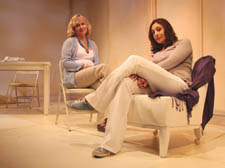|
|
 |
| |

Najla, pictured with Susan Penhaligon |
Like father… like daughter,
Najla takes on political role
Actor Najla Said is fighting familiar battles but on a new stage, as Simon Wroe discovers
NAJLA Said flops down in a chair, exhausted.
The daughter of the famous Palestinian intellectual, Edward Said, has been dancing like a Pussycat Doll all morning.
If the common thread between Said senior, the author of Orientalism, and a troupe of raunchy pop starlets is not immediately obvious, Ms Said, an actor, has been rehearsing one of her three roles in Prophecy, a new US play which opens at the New End Theatre in Hampstead this week.
“One of my characters, the acting student, misinterprets a Greek chorus as a dancing chorus,” she explains in her crisp Manhattan accent, flushing with embarrassment.
Said, 33, is not accustomed to playing such characters.
As the child of a Lebanese mother and a Palestinian father, she has spent much of her career trying to portray Arab women intelligently and accurately rather than as the wives of suicide bombers.
Gyrating like a Pussycat Doll does not often figure into this (her dance is for an American character), but one feels that for Said it might still be closer to reality than the Hollywood stereotypes of Arabs.
“There’s this whole idea that all Arab women are demure, that we wrap ourselves in head robes,” she tells me, “I see that more in the west than in Lebanon. You’re always auditioning for stereotypes, usually something to do with terrorism. That might be to do with the drama potential of a terrorist but it makes me livid. I refuse to perpetuate that.”
Besides advising casting directors and writers on the pitfalls of cliché, Said is also one of a growing number of western Arabs writing their own material.
She is a founding member of the award-winning Arab-American theatre collective, Nibras, and last year she penned the monologue play of her childhood, Palestine.
Two characters in Prophecy, a Lebanese woman and her mixed-race daughter, were based upon details of her life by the author, Karen Malpede.
Said emailed Malpede answers to her questions from internet cafés in Beirut in the summer of 2006 while Israeli troops bombed the country in retaliation to the kidnapping of three Israeli soldiers by the militant group Hezbollah.
The play, which premieres at the New End, follows the interweaving lives of a Jewish drama teacher (played by Susan Penhaligon) and her husband in New York, the Lebanese woman with whom he has an affair, and the child of that infidelity.
Said plays both the mother and the daughter, who comes to America to seek her father.
War – Vietnam, Iraq, Lebanon – is a prevalent theme.
Penhaligon, star of the classic science-fiction film The Land Before Time Forgot and a veteran television actor, is anticipating controversy; nobody knows how the substantially Jewish Hampstead audiences will react.
“One job in 10 you actually find a part that is so right for you or a play that really grabs you – this is one of those. It’s refreshing to get a play like this where the politics are so there,” she says.
“It’s going to be very interesting to do it in this theatre. In a lot of other theatres in London the audience might just say ‘So what?’ Here there might just be people who walk out.”
“Well that’s the story of my life,” retorts Najla. “In America I could do a play about hummus and tabbouleh and someone would say ‘Why do you hate Israel?’ It’s such a contentious issue, people are always ready for the argument.”
Politics have been impossible to avoid for Said. She and her older brother, Wadie, now a law professor, grew up in Manhattan’s Upper-West side, a predominantly Jewish neighbourhood, with a well-known Palestinian intellectual for a father; Orientalism, his most famous work, challenged the assumptions western culture made about the east and attacked the constraints of a romantic or crudely characterised Arab image.
Najla is still fighting that battle on the stage.
“From a very young age my father always taught me: Don’t let other people tell you your history or your story – you can tell your own story,” she says.
It has not always been easy for Najla, who was so shy that she did not speak in public when she was young.
“I was painfully shy and I still am. On stage you’re pretending to be someone else, it’s much harder to be yourself.”
On the suggestion of her father she went to drama classes to develop her confidence and fell into acting.
She continues to lives in New York with her screenwriter boyfriend, “between two worlds” in the words of her father: fluent in Arabic, raised as a Christian.
“I don’t feel like an Arab-American, I don’t know what that is. I remember wanting to be blond and for my name to have a “Mac” in it. My father would laugh at me and say ‘You want to be Irish?’. I would lie to my friends to fit in.”
She pauses, then smiles: “It’s funny, I don’t know if my father tried to prevent it, but he really raised my brother and I in exactly the same way, between worlds. But maybe it’s a blessing, I don’t know.”
•
Box office: 08700 332 733 |

|
 |
|
 |
|

